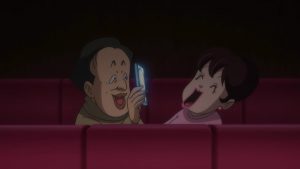 Well, that was another straight-up amazeballs episode of Gegege no Kitarou 2018. But if you’d described the premise to me and then told me it was going to be that tense and genuinely tragic, I’d have said you were crazy. There’s something special happening with this series – the viewers in Japan realize it even if the ones in the West generally don’t. It isn’t afraid to embrace the dark side of the Gegege no Kitarou mythology (which was always there) but more than that, it’s unafraid to (faithfully) update it for a new era.
Well, that was another straight-up amazeballs episode of Gegege no Kitarou 2018. But if you’d described the premise to me and then told me it was going to be that tense and genuinely tragic, I’d have said you were crazy. There’s something special happening with this series – the viewers in Japan realize it even if the ones in the West generally don’t. It isn’t afraid to embrace the dark side of the Gegege no Kitarou mythology (which was always there) but more than that, it’s unafraid to (faithfully) update it for a new era.
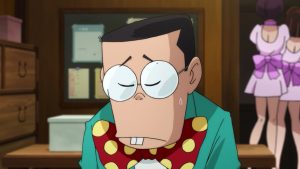 Before I get to this week’s story – which was a damn good one – I have to reiterate again just how beautiful the visuals are with this series. There were so many amazing scenes here, many of them involving water – something as simple as the surface of a river, which was depicted as gorgeously as I’ve ever seen in a TV anime. Or raindrops – what could be simpler than that, yet the fluidity and depth of field as we saw them fall from below were astonishing. And Kitarou playing hide-and-seek behind that van. I’m not sure I’ve ever seen better work from Toei, to be honest.
Before I get to this week’s story – which was a damn good one – I have to reiterate again just how beautiful the visuals are with this series. There were so many amazing scenes here, many of them involving water – something as simple as the surface of a river, which was depicted as gorgeously as I’ve ever seen in a TV anime. Or raindrops – what could be simpler than that, yet the fluidity and depth of field as we saw them fall from below were astonishing. And Kitarou playing hide-and-seek behind that van. I’m not sure I’ve ever seen better work from Toei, to be honest.
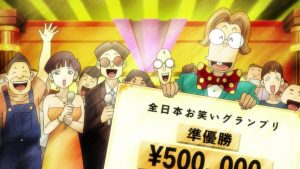 But for all that, it’s the tales this series tells that make it as special as it is (except when it isn’t). The Sara-Kozou is certainly a GGGnK standby, a kappa with a penchant for dishwashing and an ability to compose enchanting (literally) songs. He’s played here by Matsuno Taiki, and while his being a veteran of the 2007 and 1996 series is nothing new for this version, the fact that he played the same character in the 2007 is – I’m not sure we’ve seen that before. One day a down-and-out comedian named “Poor Isamu” (Numata Yuusuke – also 1996/2007, not to mention appearing already in this version) hears the Sara-Kozou singing one of his ditties by the river, and decides he’s desperate enough to steal it for his act.
But for all that, it’s the tales this series tells that make it as special as it is (except when it isn’t). The Sara-Kozou is certainly a GGGnK standby, a kappa with a penchant for dishwashing and an ability to compose enchanting (literally) songs. He’s played here by Matsuno Taiki, and while his being a veteran of the 2007 and 1996 series is nothing new for this version, the fact that he played the same character in the 2007 is – I’m not sure we’ve seen that before. One day a down-and-out comedian named “Poor Isamu” (Numata Yuusuke – also 1996/2007, not to mention appearing already in this version) hears the Sara-Kozou singing one of his ditties by the river, and decides he’s desperate enough to steal it for his act.
 One thing this ep will definitely remind you of is that where stage comedy is concerned, Japanese and Western senses of humor are… different. But the fact that everyone finds “Pettala petalako pettakko” so hilarious isn’t a function of tastes – it’s Sara-kozou’s spell (that’s a spoiler for “Kitarou” mythology I suppose, since it isn’t expressly made clear in the episode). Word gets back (via Mana, through Neko-musume) to the Gegege gang that a comic is singing Sara-kozou’s song, and Medama-oyaji knows this could be trouble – the Sara-kozou is known to be a psychotic when his copyrighted material is stolen without his permission (which he’d never give anyway).
One thing this ep will definitely remind you of is that where stage comedy is concerned, Japanese and Western senses of humor are… different. But the fact that everyone finds “Pettala petalako pettakko” so hilarious isn’t a function of tastes – it’s Sara-kozou’s spell (that’s a spoiler for “Kitarou” mythology I suppose, since it isn’t expressly made clear in the episode). Word gets back (via Mana, through Neko-musume) to the Gegege gang that a comic is singing Sara-kozou’s song, and Medama-oyaji knows this could be trouble – the Sara-kozou is known to be a psychotic when his copyrighted material is stolen without his permission (which he’d never give anyway).
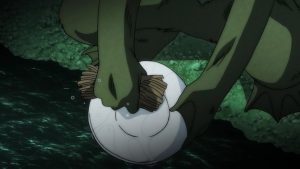 More than anything this is a tale of desperation and a thirst for the spotlight, and Isamu certainly cuts a tragic silhouette – indeed, failed comedians are uniquely bleak figures to be sure. Isamu was never more than a B-lister, a guy who finished 2nd in the national “Comedy Grand Prix” (which I assume is a thing). But even that minor celebrity was glamorous compared to where Isamu is now and he longs for another bite of the apple – even after Kitarou (unsolicited, though prodded by Otou-san) warns him that he’ll face terrible consequences if he persists.
More than anything this is a tale of desperation and a thirst for the spotlight, and Isamu certainly cuts a tragic silhouette – indeed, failed comedians are uniquely bleak figures to be sure. Isamu was never more than a B-lister, a guy who finished 2nd in the national “Comedy Grand Prix” (which I assume is a thing). But even that minor celebrity was glamorous compared to where Isamu is now and he longs for another bite of the apple – even after Kitarou (unsolicited, though prodded by Otou-san) warns him that he’ll face terrible consequences if he persists.
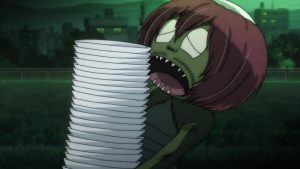 Another point this episode hammers home – Kitarou is no saviour for humans. He’ll act when it’s merited to keep the peace, and begrudgingly even out of altruism, as here – but it’s not his role to fight for humans against youkai when the youkai are in the right. After Nezumi-otoko (he drives!) makes this worse (as usual) and gets himself and Isamu captured by the Sara-kozou, Kitarou intervenes yet again – but only because Isamu’s (divinely patient, apparently) wife puts a letter in the youkai mailbox and begs him to. Unfortunately Isamu has been invited back to the grand prix – for the first time in 12 years – and visions of glory keep dancing in his head even after he’s nearly drowned in a bog for his actions.
Another point this episode hammers home – Kitarou is no saviour for humans. He’ll act when it’s merited to keep the peace, and begrudgingly even out of altruism, as here – but it’s not his role to fight for humans against youkai when the youkai are in the right. After Nezumi-otoko (he drives!) makes this worse (as usual) and gets himself and Isamu captured by the Sara-kozou, Kitarou intervenes yet again – but only because Isamu’s (divinely patient, apparently) wife puts a letter in the youkai mailbox and begs him to. Unfortunately Isamu has been invited back to the grand prix – for the first time in 12 years – and visions of glory keep dancing in his head even after he’s nearly drowned in a bog for his actions.
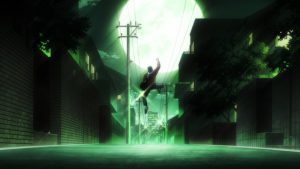 I’ll tell you what, given the superficially absurd premise it’s unbelievable how tense it is when Isamu walks out onto that stage, having been granted a third chance after squandering his second. Even the sight of his daughter pretending a new bit was hilarious (it wasn’t) to try and persuade her father not to throw his life away wasn’t enough to sway Isamu – he does try the “Bimbougami” bit but after it bombs, he goes back to “Pettala petalako pettakko”. Kitarou just walks away – he’s given Isamu more chances than he’s earned, and it’s not in his nature to stop the Sara-kozou from extracting his own justice now. Isamu chooses the adoration of the crown over a loving wife and daughter, throws it all away knowingly for a fleeting moment of reclaimed glory – the tortured soul of the comedian laid bare for all to see. This series is a dark ride sometimes, and this ending was definitely one of those times.
I’ll tell you what, given the superficially absurd premise it’s unbelievable how tense it is when Isamu walks out onto that stage, having been granted a third chance after squandering his second. Even the sight of his daughter pretending a new bit was hilarious (it wasn’t) to try and persuade her father not to throw his life away wasn’t enough to sway Isamu – he does try the “Bimbougami” bit but after it bombs, he goes back to “Pettala petalako pettakko”. Kitarou just walks away – he’s given Isamu more chances than he’s earned, and it’s not in his nature to stop the Sara-kozou from extracting his own justice now. Isamu chooses the adoration of the crown over a loving wife and daughter, throws it all away knowingly for a fleeting moment of reclaimed glory – the tortured soul of the comedian laid bare for all to see. This series is a dark ride sometimes, and this ending was definitely one of those times.


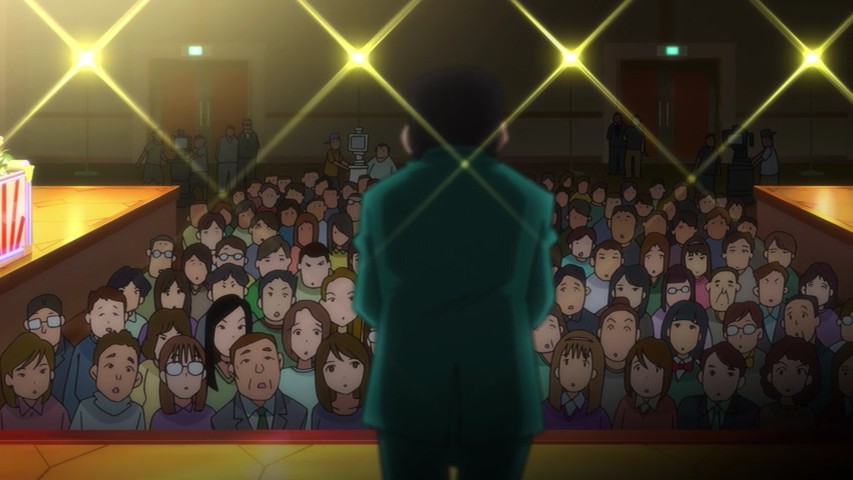
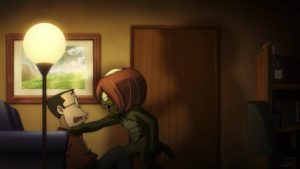

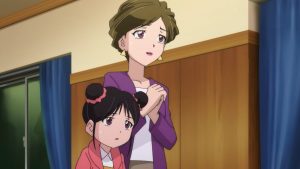

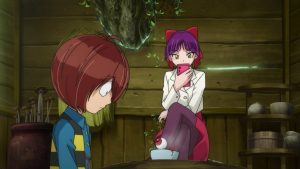

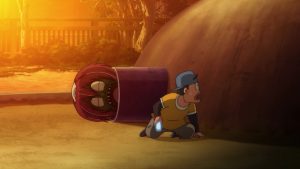

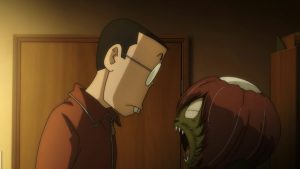

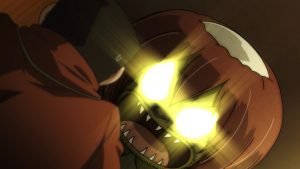

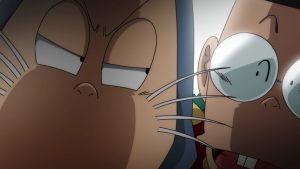
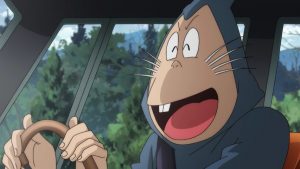


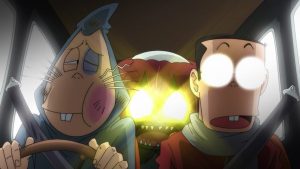



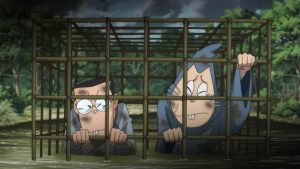

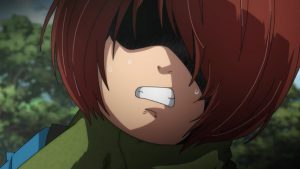
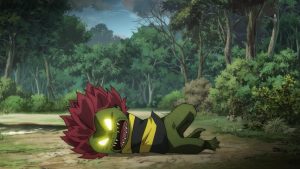
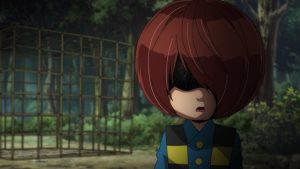

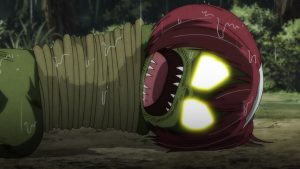
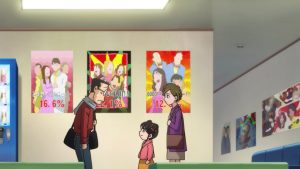

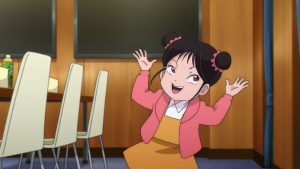


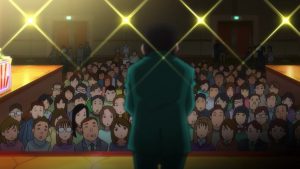

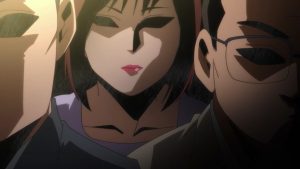
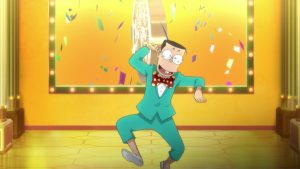

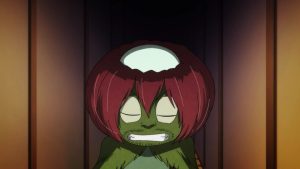

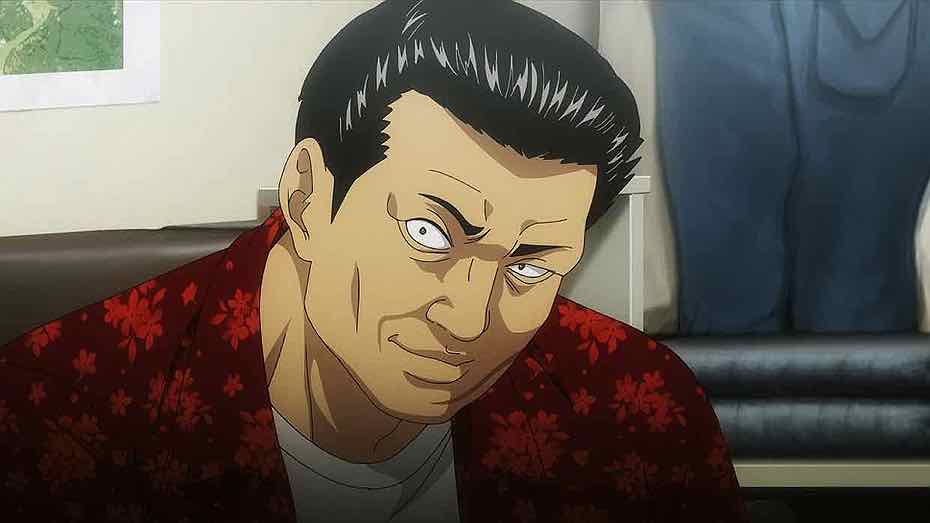
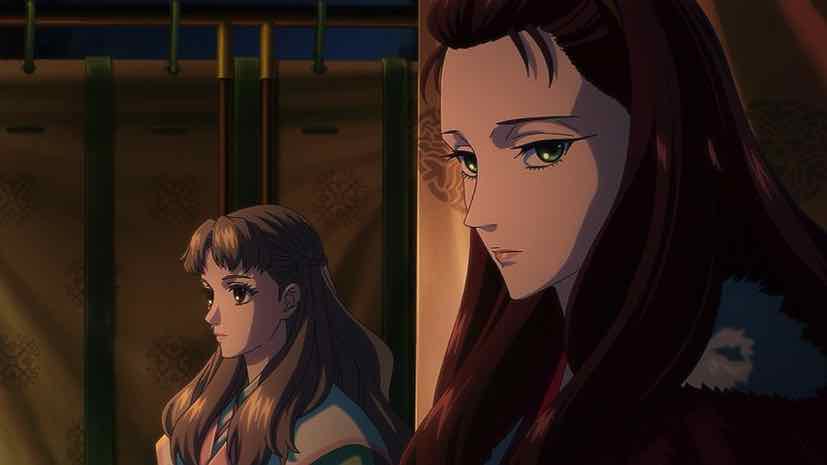
Aera
January 23, 2019 at 12:34 amWhen Kitaro acts eerie and creepy, that’s when humans should take warning.
I like the fact that most people often assume Kitaro is always on the side of humans, to the point that some humans wanted to run away from the consequences of their actions by using Kitaro (like that one episode when a man promised to make his daughter marry a youkai in exchange of wealth) and when Kitaro refused to help, they were so shocked.
Honestly, in this episode, Kitaro was being way, way too kind, and even that was because of Isamu’s wife. Sara-Kozou too, although begrudgingly, gave Isamu chances for him to reflect on his mistakes. Yet, Isamu chose to bathe under the glory that only lasted a moment, and would probably end the moment he stepped away from the stage and met Sara Kozou in the backstage.
Glory could really blind humans’ eyes to the right thing.
After the Great Yokai War arc ended, Gegege no Kitaro really returned to its greatness.
Guardian Enzo
January 23, 2019 at 7:10 amYeah, while that arc did get better, it was clearly the weak point of the series as a whole so far.